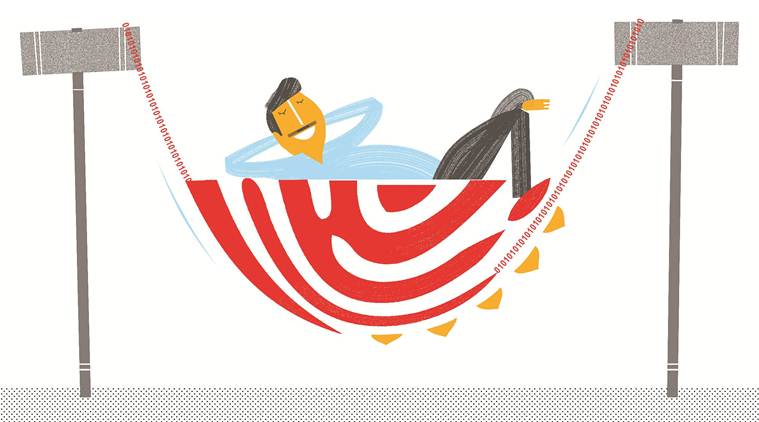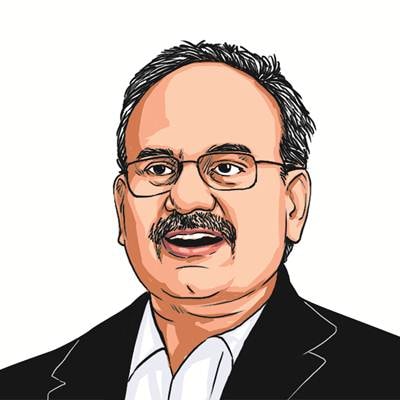Shaping digital destiny
Apex court’s verdict removes misapprehensions on Aadhaar, will cleanse system of fakes and duplicates, ensure that services reach intended beneficiaries.

The historic verdict is a victory for India and Bharat as it will shape our digital destiny. (Illustration: CR Sasikumar)
After six years of litigation which included 38 days of hearing — next only to Kesavanand Bharati case in 1973 — the Supreme Court’s five-judge Constitution Bench has given a landmark judgment declaring Aadhaar as constitutional. Aadhaar has the distinction of being the world’s largest biometric unique identity programme for empowering 130 crore people. But debates on it have also brought to light issues concerning personal liberty, privacy and data protection. So, we must first understand the circumstances under which the programme was started.
After more than six decades of Independence, 60 per cent of India’s 1.2 billion people did not have a basic identity document. By and large local ID documents were used and they became unrecognisable when a person crossed the boundaries of his home state. For example, a ration card issued in Tamil Nadu wouldn’t be recognised in Delhi. That was perhaps why a majority of the country’s population did not have a bank account. The first question to anyone who wanted to avail a service — open a bank account, apply for a ration card or voter ID card, buy land or take a loan for his small business or agriculture or apply for government benefits — would invariably be: “Who are you?” Without an ID proof, it was virtually impossible for people to answer this question. They often ended up being denied such services.
Unscrupulous people manipulated the system by creating ghost and duplicate entities and usurped the benefits intended for the poor. It is well-known that only 15 paisa of each rupee spent on welfare programmes reached the intended beneficiaries.
Against this backdrop, a technologically complex identity programme, then called the Unique Identification (UID) Programme, was launched on a scale not known in human history. In 2016, Parliament provided the legislative basis to Aadhaar by enacting the Aadhaar Act. In the last eight years, the programme has turned out to be the world’s largest biometric identification programme — it caters to one-sixth of the planet’s population. Indians can take pride for creating such a sophisticated identity platform in such a short span of time
Aadhaar helped the government renovate the delivery system and ensure targeted, hassle-free, direct, portable, real time, auditable delivery of services, benefits and subsidies, free of middlemen. It is being used for distribution of foodgrains through fair price shops. Aadhaar has led to the elimination of crores of ghost and duplicate ration cards and fake MGNREGS job cards; it has checked frauds in pension payments and other government schemes including those that benefit students. In the past three years, it has saved the government more than Rs 90,000 crore. The World Bank’s Development Report on Digital Dividends 2016 estimated that the use of Aadhaar in all the Centre’s benefit and welfare schemes could save the government over US $11 billion annually by reducing leakage, and through efficiency-related gains.
By directly connecting the state with the people, Aadhaar enhanced the government’s ability to serve the citizens better. Unfortunately, this was projected as an increase in the state’s power and led to Aadhaar being perceived as an instrument of state surveillance. India’s effort to provide unique identification to people and digitise its citizen databases, public or private, was mistaken as an exercise in the invasion of privacy. Its critics undermined the truth that Aadhaar empowers the people, not the state.
How can anyone claim state benefits funded by taxpayers’ money without identifying oneself? The critics forgot that it was the state’s responsibility to identify the beneficiaries in order to make sure that benefits reach those they were intended for. A section of people also perceived Aadhaar as a tool of denial and exclusion. Some critics also raised questions about the efficacy of Aadhaar technology. Others attempted to create technophobia by blowing out of proportion certain risks such as the possibility of biometric cloning or the hacking of databases. Every technology has some risks. A mature society must take measures to mitigate risks and not abandon the technology.
The Supreme Court’s historic verdict has not only held Aadhaar to be constitutional but has ruled that Aadhaar ensures dignity of individuals and empowers marginalised section of the society. The Court has held that Aadhaar’s architecture does not create a surveillance state. It has gone on to say that “the Aadhaar Act meets the concept of limited government, good governance and constitutional trust”. The judgment has upheld the mandatory requirement of Aadhaar for PAN cards and income tax returns. This is indeed a victory for Indians, particularly the marginalised and underprivileged sections of the society.
Aadhaar will not only bring transparency in governance but will also cleanse the delivery system of fakes and duplicates and check impersonation in multiple areas such as examination and recruitment. It will help to curb tax evasion, money laundering, shell companies and benami transactions and bring in financial discipline and greater tax compliance. It will continue to help unite missing children with their loved near and dear ones. In a lighter vein, Bollywood would have to abandon its oft-repeated scripts — like twins getting separated.
The judgment is in line with last year’s landmark privacy judgment and will set at rest many debates, apprehensions, and controversies around Aadhaar. The safeguards and restrictions mandated by the court on data security and usage by private companies will strengthen Aadhaar. It will help ensure that no deserving beneficiary — whether a senior citizen, people engaged in manual labour — is denied welfare for the lack of Aadhaar or a technical glitch.
The historic verdict is a victory for India and Bharat as it will shape our digital destiny. Aadhaar will undoubtedly be a game changer for the poor and the country as a whole.
The writer is CEO, UIDAI
For all the latest Opinion News, download Indian Express App
More From Ajay Bhushan Pandey
- The new Luddites’ paranoiaCritics of Aadhaar are raising an alarm based on unfounded concerns...
- Going digitalAll technology is vulnerable. What is needed is mitigation of risks of Aadhaar, not its abrogation..
- The demonisation of AadhaarIt is unfortunate that many sincere social workers, activists, and economists are not able to see through it..












.png)



























No hay comentarios:
Publicar un comentario